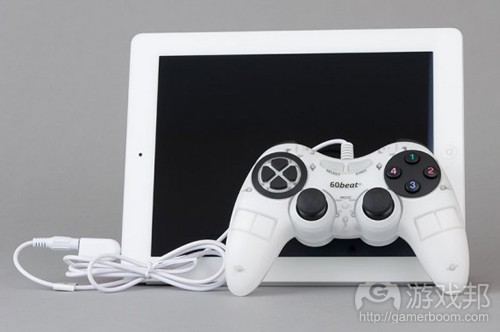“苹果游戏控制器”或成下一代掌机设备杀手
作者:Chris Morris
在下一代掌机系统即将问世,行业中充斥大量关于新一代Xbox或PlayStation的传言之际,我开始好奇微软和索尼到底有没有注意到苹果的动向,是否已察觉到苹果正将触角伸向家庭起居室游戏领域。
虽然乔布斯对游戏领域并未投入过多关注,但这却并不妨碍App Store迅速将iPhone、iPad和iPod Touch打造成强大的掌上便携游戏设备——尽管它使用的是与任天堂、索尼截然不同的运营模式。最近有报道称苹果正在开发独立的游戏控制器硬件,再加上关于Apple TV的传言,我们不难发现苹果新掌门Tim Cook并不会无视这个价值600多亿美元的产业。
“苹果控制器”+Apple TV可能将成为一个强大的组合,主流社会已经迎来手机应用时代,硬核游戏玩家对手机游戏也同样是青睐有加(虽然他们还没有放弃传统掌机游戏)。苹果控制器虽然未必是苹果硬件拳头产品,但也很可能进一步促使硬核玩家分心,导致传统掌机设备“失宠”。
我认为,无论这种控制器究竟将出自苹果还是第三方之手,苹果进入游戏领域的真正杀手锏应该是AirPlay。通过iPad使用AirPlay可以创造无缝隙的电视游戏体验,而且它不存在潜伏期的问题(游戏邦注:作者认为即使存在这个问题,一般也不会被玩家所察觉)。虽然AirPlay不适合《愤怒的小鸟太空版》这类游戏,但目前能够阻碍苹果实现这种转变的杀手级应用并不多。而假如这种苹果游戏控制器真的问世了,它只会加快苹果转型。
苹果在游戏领域方面的作为已经颇得人心,得到了多数主流发行商的支持。虽然EA和Take-Twon等公司主要收益仍来自传统掌机游戏,但他们也正不遗余力地扩大手机游戏业务,确保主流游戏产品在苹果设备和掌机设备上都能获得足够的曝光度(另外需要注意的是,iOS游戏开发成本更低,相信多数开发商都难以抗拒这种诱惑)。
同时,Epic Games在上个月的苹果新iPad发布会上也对苹果产品极为推崇,声称“比起Xbox 360或PS 3,苹果新iPad内存和屏幕分辨率更高”。
苹果控制器的这一说法出现于微软和索尼准备打响下一代家用掌机设备大战之时,假如这种传言成真,我想该设备的关注重点仍将是服务而非硬件,因为这正是苹果的专长。
对微软和索尼来说,更糟糕的情况是,根据某些媒体报道及部分知情开发者所称,这两者的下一代掌机设备并无突破性创新,并且其严格苛刻的DRM(数字版权)系统很可能惹恼游戏玩家。
虽然这两种设备将无法运行二手游戏只是一种危言耸听的说法,但与EA的“Project 10美元”计划相似,玩家还是很可能需要付费才能激活系统上的二手游戏(不过这一计划可能同时适用于游戏中的单人和多人模式)。
上述情况很可能让玩家对这些设备制造商产生不良印象。而苹果在用户中的支持率却一直很高,ChangeWave Research最近发布的报告显示,98%的新iPad用户对苹果新平板电脑设备感到满意,其中有82%自称“非常满意”。
此外苹果设备的市场行情也一直很乐观,据J.P. Morgan预测,今年第一季度iPhone销量将达3110万部,iPad销量将达1380万部(游戏邦注:我们可以通过4月24日的苹果财报会议公布的真实数据验证其预测的准确性)。
当然,苹果游戏控制器问世并不一定就是掌机设备的末日,但它很可能威胁后者的市场份额和影响力。
但家用掌机设备仍有自身的一些优势,首先,它们在这一行中的发展历史更悠久——-因此对此类用户的了解甚于苹果,它们更善于取悦硬核游戏玩家。
更重要的是,苹果目前缺乏乔布斯的那种想象力,正是乔布斯的完美主义将苹果产品推向消费者电子产品领域的颠峰,但苹果在未来几年中保持这种魔力的难度将大为增长。(本文为游戏邦/gamerboom.com编译,拒绝任何不保留版权的转载,如需转载请联系:游戏邦)
Opinion: Apple’s shadow looms over next generation consoles
by Chris Morris
As the next generation of console systems looms, and the industry devours any scraps of gossip about the next Xbox or PlayStation, I’m starting to wonder if Microsoft and Sony are paying enough attention to Apple – and the threat it presents to their living room dominance.
While Steve Jobs never had a big interest in the gaming world, the app store quickly made the iPhone, iPad and iPod Touch portable gaming powerhouses – albeit using a vastly different model than Nintendo and Sony. These days, Tim Cook is running the show – and he’s not an executive who’s going to ignore a $60 billion-plus industry.
The preliminary steps already seem to be underway. Reports surfaced this week that Apple is already working on standalone game control hardware, and there are also whispers about AppleTV.
The two together could be a potent combination (with the addition of the current standalone AppleTV device being another weapon in the company’s arsenal). The mainstream world has already embraced apps – and core gamers are playing them more often as well (though certainly haven’t given up on traditional titles).
A controller, while it tends to fall outside of Apple’s hardware wheelhouse, could give those core gamers a reason to take a step away from their consoles.
Whether that controller comes from Apple or a third party building off of the company’s hardware, the real key to Apple’s entree into gaming could be AirPlay. Gaming on your TV via the iPad using AirPlay is a seamless experience. It looks good. There are no latency issues (or, if there are, it’s not something most players would notice). And while AirPlay might not be ideal for titles like Angry Birds Space, it seems just one killer app away from transforming Apple into a legitimate threat to the industry.
And if that game controller is, in fact, being made, it will only hasten the transformation.
Apple’s gaming efforts have already won the company the support of most major publishers. While EA and Take-Two certainly make the bulk of their income from traditional console games at present, they’re taking steps to protect against a broader shift to Apple-centric gaming by expanding their mobile divisions and ensuring major franchises have equal exposure on iDevices and consoles. (Let’s face it, the lower development costs don’t hurt either, especially with the hike that comes with a new generation of consoles.)
Meanwhile, last month, Epic Games threw its considerable weight behind the company, when president Mike Capps, speaking at an Apple press event unveiling the new iPad, declared: “This new device has more memory and higher screen resolution than an Xbox 360 or PS3.”
Apple’s maneuvering occurs as Microsoft and Sony prepare to do battle with their next generation of home consoles. And if the rumor mill is right, the new machines will be less about hardware and more about services. That’s an area Apple specializes in.
Even more troubling: Judging by media reports and what I’ve heard from developers who have been briefed on the systems, there’s nothing really revolutionary-sounding about either machine to date. And the strict DRM measures Sony and Microsoft apparently plan to take with the new machines are likely to irk gamers.
While alarmist cries that both systems will make used games unplayable are ridiculous, players are likely going to have to pay a fee to activate a used game on their system – similar to EA’s widely copied “Project $10″ initiative (though it will likely extend to both single- and multiplayer elements of the game).
That’s creating a lot of ill will towards the companies now among players. Apple, meanwhile, is seeing off the charts satisfaction. A study released Monday from ChangeWave Research finds that 98 percent of owners of the new iPad are satisfied (with 82 percent saying they were “very satisfied”).
Sales seem to be ahead of expectations as well, with J.P. Morgan predicting first-quarter iPhone sales of 31.1 million and iPad sales of 13.8 million. (We’ll learn the actual numbers on April 24 during the company’s earnings call.)
Of course, this is hardly an all or nothing situation. An Apple entry into the living room gaming space won’t sound a death knell for consoles, but it could weaken them.
The good news is home consoles have some advantages in this fight. First, they’ve got a long history in this business – and know the audience better than anyone at Apple. That can help them keep the core gamers satisfied as they wage war for the mainstream.
Perhaps more importantly, though, is Apple’s current lack of a visionary as focused as Steve Jobs was. His drive for perfection pushed the company to its current spot in the consumer electronics field, but keeping that magic touch will be increasingly more difficult in the years to come. (source:gamasutra)
上一篇:制作人总结10大游戏开发经验








































 闽公网安备35020302001549号
闽公网安备35020302001549号